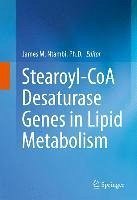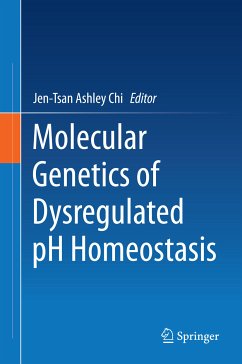
Stearoyl-CoA Desaturase Genes in Lipid Metabolism (eBook, PDF)
Versandkostenfrei!
Sofort per Download lieferbar
112,95 €
inkl. MwSt.
Weitere Ausgaben:

PAYBACK Punkte
56 °P sammeln!
Obesity and diabetes develop as a complex result of genetic, metabolic and environmental factors and are characterized by increased lipogenesis and lipid accumulation in many tissues. Stearoyl-CoA desaturase (SCD) genes are a critical regulator of lipogenesis and catalyzes the synthesis of monounsaturated fatty acids (MUFA), mainly oleoyl- (18:1n9) and palmitoleoyl-CoA (16:1n7). These MUFAs are the major fatty acid substrates for the synthesis of triglycerides, cholesterol esters, wax esters and membrane phospholipids. There are 4 SCD isoforms (SCD1-4) in mice and two (hSCD1 and hSCD5) express...
Obesity and diabetes develop as a complex result of genetic, metabolic and environmental factors and are characterized by increased lipogenesis and lipid accumulation in many tissues. Stearoyl-CoA desaturase (SCD) genes are a critical regulator of lipogenesis and catalyzes the synthesis of monounsaturated fatty acids (MUFA), mainly oleoyl- (18:1n9) and palmitoleoyl-CoA (16:1n7). These MUFAs are the major fatty acid substrates for the synthesis of triglycerides, cholesterol esters, wax esters and membrane phospholipids. There are 4 SCD isoforms (SCD1-4) in mice and two (hSCD1 and hSCD5) expressed in humans. At first glance, stearoyl-CoA desaturase enzyme would be considered a housekeeping enzyme because it synthesizes oleate a well-known fatty acid that is abundant in many dietary sources. However numerous studies have shown that SCD is a very highly regulated enzyme that features in so many physiological processes ranging from fat differentiation, carbohydrate and fat metabolism, inflammation and cancer. The editor's studies using stearoyl-CoA desaturase knockout (SCD1-/-) mice and studies of other investigators using pharmacological approaches to reduce SCD1 expression in mouse tissues have all established that the expression of SCD1 gene isoform represents a key step in partitioning of lipids between storage and oxidation. High SCD expression favors fat storage leading to obesity while reduced SCD expression favors fat burning and leanness. Although these studies clearly illustrated that SCD1 expression is involved in the development of obesity and insulin resistance, questions remain in the elucidation of the mechanisms involved and role of SCD1. This book includes chapters by leading researchers on SCD Genes in the brain, heart, muscle, liver metabolism, Colitis, and more. ¿
Dieser Download kann aus rechtlichen Gründen nur mit Rechnungsadresse in A, B, BG, CY, CZ, D, DK, EW, E, FIN, F, GR, HR, H, IRL, I, LT, L, LR, M, NL, PL, P, R, S, SLO, SK ausgeliefert werden.













